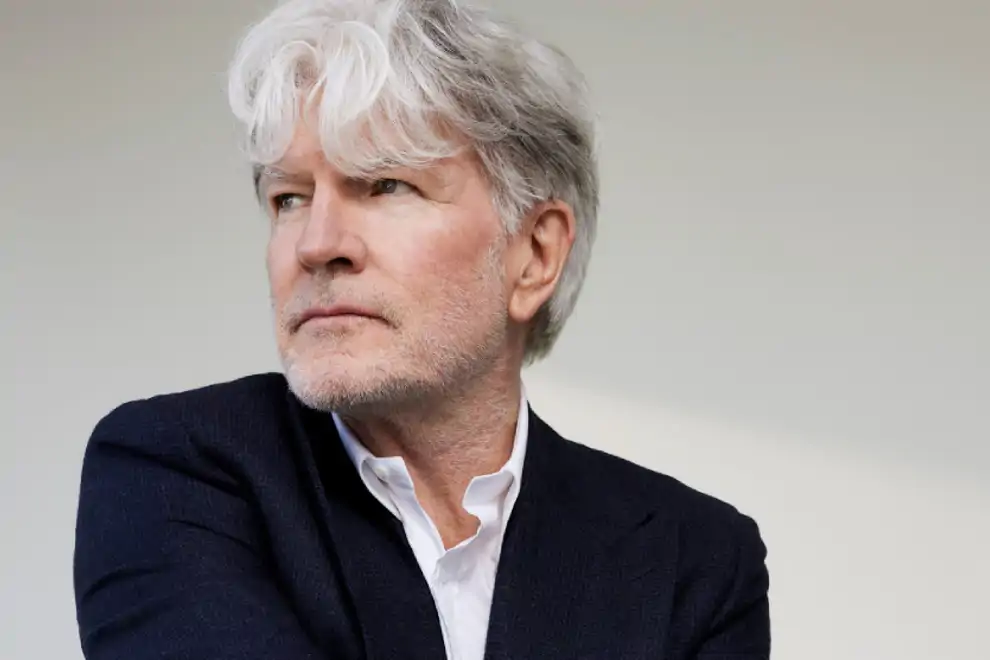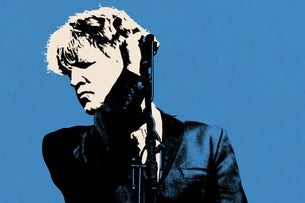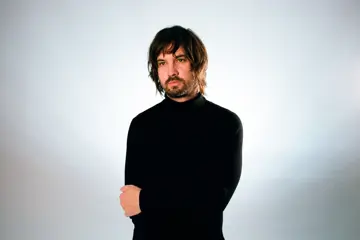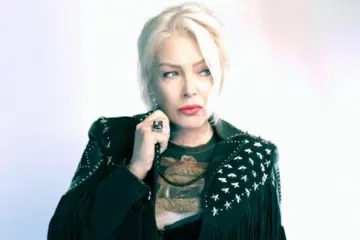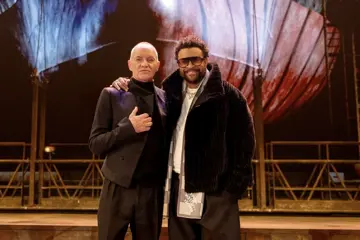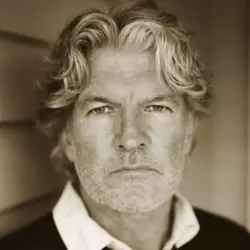 Tim Finn
Tim FinnWhen you’ve been creating and performing world-class music for more than 50 years - as is the case with iconic New Zealand singer-songwriter Tim Finn - then it’s quite the commitment pulling together a tour offering fans a comprehensive career overview. That’s a lot of memories to unpack, a lot of songs to consider, and a lot of fandom to try and please or placate.
Yet Finn is indeed about to embark on such an ambitious endeavour, a celebration of his creative journey titled The Lives And Times Of Tim Finn concert tour.
The full-band production will be covering the entire gamut of his storied career - from the halcyon ‘70s days of the world-conquering Split Enz, through his brief stint in Crowded House (both of those projects shared with his younger brother Neil) to his lengthy and enduring solo career - each a disparate but distinguished body of work, replete with their own classic moments and song standards that pretty much demand inclusion in such a project.
And while of late, Finn hasn’t been found onstage as often as he might have been in the past - having spent the last decade mining the worlds of music theatre and opera for his creative fix - it was a random one-off solo performance in late 2022 at Manly in Sydney’s Northern Beaches where he “focused on the old stuff” which really inspired his return to the rock’n’roll realms.
Don't miss a beat with our FREE daily newsletter
“Yeah, I think that gig just reminded me of what I’d been missing,” the elder statesman reflects. “I’d done the odd festival over the last ten or 15 years - particularly in Australia; there’s some great festivals over there like Woodford [Folk Festival] and The Lost Lands, really eccentric one-off events, plus obviously Splendour and Byron Bay Blues et cetera - but they were very sporadic and very spread out, and usually involve a shorter set-list and no control over the sound. You’re just thrown to the lions, and you ride the wave as best you can.
“The idea of doing a show that I have more control over, and that I can structure chronologically from starting around 1977 and just doing the songs as they were written in sequence became really appealing. It would be impossible to do the whole span because there would just be too many songs, but it’s great to curate your own set from your life.
“But as I played that show the connections between those songs and the audience were very clear to me, and the band had learned all the songs so that when we were doing the Enz songs they were playing all the rights bits and it was just sounding really good and the crowd were going right with it.
“They were a very cross-generational crowd - there were some young people there who’d probably never seen me play, which is always fun and you could see them grooving around out there, and there were people that knew every word - it was a very good feeling, and made me want to do it again.”
Finn explains that once you’ve experienced that connection with a vast adoring crowd, it becomes a somewhat addictive pursuit.
“It’s a genuine connection,” he smiles. “It’s my job up there to create an experience. It’s not so much awakening memories but more an actual experience happening there and now between me and those people.
“We’re not sitting on our couches watching Netflix, we’re kinda doing something together - it’s very communal, which there are less and less occasions for these days because everything’s gone online or invisible. So it’s great to bring people together, and I think obviously music can do that really well.”
Split Enz first came to the attention of Australian audiences during the mid-‘70s when the nation was still collectively transfixed by the weekly musical missive Countdown which graced their TV screens each Sunday night (back when even capital cities had only a small handful of TV channels).
With their distinctive brand of art-pop augmented in those early days by their penchant for dressing up in strange homemade outfits and sporting weird makeup and even weirder hairstyles, the band seemed like they’d come from a lot further than across the ditch - perhaps even from another solar system.
“We were pretty out there, I guess,” Finn chuckles. “We were aware of that, but there was also a sort of un-self-conscious aspect to that as well. Neil Crombie used to make our clothes - he was our percussion player and eventually ended up being our drummer - and before a tour started or when an appearance on Countdown rolled around we’d be wondering, ‘What are we going to wear this time?’
“And there was a real excitement about that because it was all hand-crafted and he’d be thinking about our personalities and who we were and making us clothes that would reflect each of us individually, but also brought us all together. So, by the time we kinda climbed into them and got the whole thing ready, it was like we were one thing, with 16 legs or whatever it was.
“It was pretty exciting; it was an art project, really - the way it looked, the way it sounded - but at the same time we were really keen to communicate. We weren’t trying to be off in some bubble somewhere, we were really interested in entertaining people and walking that fine line I suppose between something that had humour and wit in it and something that could be profound.”
The Split Enz canon is an idiosyncratically theatrical body of work, and Finn - who wrote most of the songs in the early years before Neil started honing his writing chops and contributing classics as well - admits that it’s virtually impossible this far down the track to revisit the mindset of his younger self and recall what he was feeling when the songs were conceived.
“No, I really don’t remember any of that,” he admits. “I’m dimly aware of it, but it’s more that my task is to make something happen there and then. The songs are dramatic expressions of emotions and feelings that - unless you’re an enlightened being who’s been in a retreat for years - you’re going to be subject to those emotions throughout your life.
“We human beings are very emotional creatures, and sometimes we love that, and it’s a joyous feeling, and sometimes it’s absolute pain, so I guess I just tap into the stuff that we’ve all got inside us and bring it out. Songs like Dirty Creature or I See Red are very dramatic expressions of certain emotions - whether it’s fear or anger or whatever - and then there’s love and loss, all the good stuff.”
The music of Split Enz has aged well and still seems vibrant all this time later, something Finn puts down to the songs’ initial construction.
“I think if you’re truthful in your songwriting, the song will hold its value over time,” he reflects. “Not that it’s about being too specific or deliberate about things - you want to keep a certain poetic dimension to it, I suppose, or the song doesn’t have life - so if the song is still alive after 30 or 40 years it does come from somewhere real, but you’ve found a poetic way of expressing it and it can speak to you decades later because it’s just a human story.
“And I’ve always thought that the deeper you go inside yourself, the more you find things that are in common. It’s all of the surface things that divide us - like language and clothes and music taste, or however you want to break it down - but if you dig deep, we’re all the same.”
Finn’s first foray outside the comfort zone of Split Enz occurred in 1983 when he released his acclaimed debut solo album Escapade, which while faring well commercially - it rose to #1 in New Zealand and went Top 10 in Australia, spawning the hit single Fraction Too Much Friction - sadly seemed to sound the death-knell for the Enz.
“I had a bunch of songs half-written or songs that I’d been jamming on with the Enz in rehearsals or soundcheck, but they hadn’t really worked for one reason or another, Fraction Too Much Friction was one of those,” he recalls. “I knew they were good, but I just hadn’t found the right groove or the right expression.
“Then I heard a track by Renée Geyer about that time - it must have been a hit, but I can’t think of the name of the song - but I knew that whoever was playing drums on that track was who I needed to work with, and it was Ricky Fataar who’d been in the Beach Boys for ten years but then come out to Australia to live with his family.
“Ricky was a portal for me, a doorway to such much; he introduced me to so many musicians. I kinda knew what I wanted, but I also didn’t - I was very open - and that whole album was very unplanned; it wasn’t thought out or strategic or any of that; it was just trying to find a new exciting place to be musically, and I found it.
“We did it really quite fast - it was an easy album to make and a joyous album to make - and it seemed to strike a chord. It basically disrupted my life in Split Enz to a degree that I hadn’t expected - I only ever played five live shows, and I would have loved to have played more - but I felt guilty and just wanted to get back into the band, which I loved.
“But in the end, it did prove to be kind of a disruptor and a defining event really in my music career, because [Split Enz] did one more album together and then I was off. I’d had a taste of something I suppose.
“Look, the Beatles split up after 10 years, and they were always the template; we lasted 12 years. It just seems quite right to me really that bands should break up, although some don’t have to: they take five-year breaks, and all go off and do solo projects, which is another way of doing it.”
Escapade set the tone for the long and distinguished solo career to follow, although the singer admits that there won’t be too many latter-era solo cuts being aired in the forthcoming concert celebration.
“As I say, I sort of ran out of steam with the setlist because I’d already assembled a full show and I was only in the mid-‘90s,” he grins. “Plus I want to play songs that people know and a lot of those solo songs are lesser-known. I cherish them just as much as the hits, but I want to play songs that people know so we can make this experience together.
“It’s a different thing to just playing some tunes from your latest record, it’s about diving back into past songs and making something happen between us - people can sing with me if they want, or just relate it to their own lives - it’s a pretty exciting thought.”
Another important - albeit brief - moment in Finn’s career came when he joined his younger brother’s lauded outfit Crowded House for their revered 1991 third album Woodface.
He and Neil had been writing songs together around that time for another project, but when Crowded House were struggling for new material the elder Finn - along with those songs - was co-opted into the fold, a union that produced one incredible album but sadly didn’t last until the end of the touring cycle for that record.
"I think we all knew that something wasn’t quite right,” he admits. “I actually had a whole lot of songs standing by which I was really keen to record - including the song Persuasion, which is a really important song for me, especially in the States where it got a lot of airplay - so I guess I wasn’t quite right for that band environment. Perhaps it was too Finn-centric - there were too many Finns all of a sudden - and maybe Paul [Hester - drums] and Nick [Seymour - bass] felt a bit squeezed out or something.
“But in the end, Paul called a meeting, and we just sat around, and we were really honest with each other. What they needed was a keyboard player, and my whole experience to that time had been being the lead singer of Split Enz. It’s pretty hard to push that square peg into a round hole, you know?
“But we did some great shows, and I’ll always remember Paul Hester ringing me up quite a few years later and he’d been listening to a live recording that we did at Jindabyne, and he said, ‘Mate, we were the best band in the world!’ I think he felt a bit guilty about calling that meeting - I don’t know - but he didn’t need to, because I loved Paul; we were great friends, but he was going back through it and felt obliged to reach out.
“We were pretty good. That show he gushed about was a promotional tour with the four of us playing semi-acoustic, and anybody who saw that show would have experienced something special.”
Fortunately, the brothers were able to quickly put this episode behind them, rekindling their project together which in 1995 manifested as the wonderful album Finn - released under the moniker The Finn Brothers - which fully showcased the incredible and indelible musical bond shared by the two.
“I think it was how we grew up together,” Tim smiles at the brotherly connection. “There was a lot of music growing up in our house - just live music, friends coming over, Mum and Dad having parties and everyone singing around the piano and stuff - and it was very impactful.
“I’m talking about when I was maybe 8, 9 and 10 and Neil was probably 3, 4 and 5, and we’d get up and sing a song if we were asked. Mum had shown us how to sing a harmony - and we’d learned just by listening to her; she’d sing a harmony with one of us while she was washing the dishes or something.
“It sounds very folksy and human and family and all that, and it really was. But it wasn’t always idyllic, there were undercurrents of other things - not everybody was super well-behaved all the time, and there were incidents and various things going on - but essentially there was a lot of bonding through music, and that’s what we learned at a very early age.
“So when we get together now we can tap into that tide pool of memories, and we don’t even have to talk about it; it’s just there, and we draw from it. We can relate it to who we are now, but at the same time it’s very timeless for us.”
All these years later, it seems that the eclectic Finn is slightly under-appreciated compared to the rest of the brothers’ respective canons, not that the elder Finn seems to mind.
“Neil and I love that record, and as the years have gone by it’s only gotten better really for people,” he tells. “It did go under the radar a bit at the time, but the people who love it really love it - it was a special time for both of us to make that record. We were both perfectly in the right space at the right time.”
Despite his impending walk down memory lane Finn has never stopped writing and creating music, and he’s loving the luxury of being able to look forwards and backwards at the same time with his music.
"Yeah, I like the way you put that, and it’s exactly right,” he laughs. “There was that Roman god Janus who was able to look backwards and forwards at the same time, and it is like that in a sense - although all time sits in the moment.
“When you’re in the moment in a concert, it’s kinda timeless - we all go into that space - and music can do that for us I think; it’s one of the few things that can interrupt the broadcast. The chattering mind quietens down and calms down, and we’re together in that timeless space, that equipoise or fulcrum between the past and the future and the present; there’s nothing like it.
“It’s kind of ecstatic that feeling, and we all know that feeling when you’re at a gig, and you might drift in and out of it - it’s not like it’s going to be there for the whole show - but they’re delicious moments to savour.”
Tim Finn is embarking on his ‘The Lives and Times’ tour of Australia next week. You can find tickets via the Live Nation Australia website.
THE LIVES AND TIMES OF TIM FINN
AUSTRALIA 2023 TOUR
With special guest Hayley Mary
Palais Theatre, Melbourne - Wednesday, 13 September
Fortitude Music Hall, Brisbane - Thursday, 14 September
Sydney Opera House, Sydney - Sunday, 17 September

